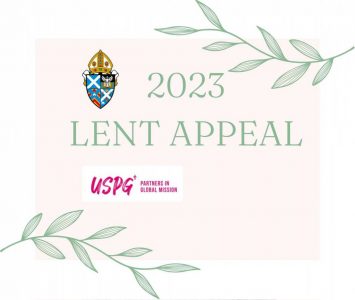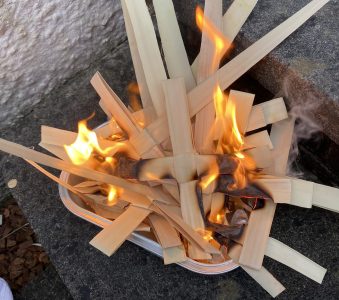Martin Tarr

As it says on the Diocesan website: “The United Society Partners in the Gospel (USPG), as part of this year’s Lent Appeal, encourages us to acknowledge that our neighbours are not just those in our hometowns. Your neighbour is the person that God calls you to love despite your differences. We pray with our Church partners around the world and stand with their mission to support vulnerable people in their local communities. Please join the global Anglican church in transforming lives.
“This year we stand with and pray for our neighbours in Tanzania and Sri Lanka:
- The Church of Tanzania’s Prevention of Mother to Child Transmission of HIV programme
In the Chamwino district of Tanzania almost all women of reproductive age were afraid to go into hospitals. The Church of Tanzania’s prevention programme provides both the practical and medical support needed to prevent the virus being passed on from mothers to their children. Thanks to this programme, babies are being born HIV free, breaking the chain of infection.
- The Church of Ceylon’s response to the economic crisis in Sri Lanka
Sri Lanka is undergoing its worst economic crisis since the country’s independence in 1948. The soaring cost of living caused by food and fuel shortages has caused power cuts, a lack of medicines and the near collapse of the health system in the country.
“Further information on these important programmes and an accompanying Lenten Study Course Who is Our Neighbour?can be downloaded here.
“We have the opportunity, through this appeal, to help the USPG fund the work of our partner churches there and their life-changing programmes.”
St Margaret’s will again be supporting the appeal, and an open-plate collection will be taken on Palm Sunday and Maundy Thursday.

Below are two extracts from Rev Sheila Cameron’s sermon on Ash Wednesday, 22 February 2023, when our readings had included Isaiah 58:1–12 and John 8:1–11.
We are all beloved children of God, but we must “participate in our own redemption.” Today, at the beginning of Lent, our liturgy invites us to enter the darkness of our sin, to recognize it for what it is and face the pain it has caused ourselves and others. We may find consolation in the thought that our sins are perhaps less extreme than other people’s but so, of course, did those preparing to stone the woman caught in adultery. It’s not our business to feel holier than others and to cast stones at others, but to know that our nature is flawed and reflect on our own shortcomings.
…
Isaiah warns us not to pay mere lip-service to our liturgy this morning, for receiving ashes on our faces will do us no good at all if our hearts are hardened towards the needs of those around us. We are entering what our liturgy calls a “desert of repentance,” forty days of reflecting on how we might be God’s people once again. This, we’re told, is a journey of discovery, “a pilgrimage of prayer and discipline” through which we hope to reconnect with the God we have offended by our sinfulness and our disregard for the welfare of others.
The promises of renewal are there in our reading from Isaiah: the promise of light breaking into our darkness like the dawn, of healing springing up quickly, of the glory of God shielding and protecting us. In this place of contrition, our prayers will be answered, for God never disregards a cry from a broken and a contrite heart. We wait sorrowfully and yet expectantly, and it’s best if we don’t anticipate anything precise, for when the light comes it will certainly arise in unexpected places.
Do read the whole sermon, which is available at this link, if only to read the first illustration! Sheila ended quoting and commenting on sections of Louis Untermeyer’s poem, Ash Wednesday, which you can read in full on-line at this link.
Our picture is the one taken by our friend Liz Crumlish to accompany the Ash Wednesday 2023 thought on her blog, and can be seen in context at this link.
Everyone will be welcome at the next meeting of the St Andrews West Area Council, which will be held in St Peter’s, Kirkcaldy on Tuesday 21 February at 7.30pm. The guest speaker is Carol Morton (a member of St Peter’s) and her talk will cover Palestinian Christians Cry for Hope, Sabeel-Kairos UK, the hoped-for movement within SEC dioceses, her 9½ years in Jerusalem and the work there, as well as her current service with the Hadeel Palestinian Fair Trade shop in Edinburgh.

Please allow me to read to you seven verses from Paul’s letter to the Rosythians:
- Dear friends, observe for yourselves that uniformity does not exist in nature, but only in the minds of men and women.
- Recognise that God loves diversity, for diversity is the key to survival in all that is alive. Therefore celebrate your differences.
- Reflect on your different ways and see how they can bring strength to all who are living in his service.
- Waste no time on things which may bring you negativity, but build upon the same foundations of the many good things that prevail amongst us.
- Be confident that, in God’s sight, your individuality makes a good servant but is a poor master.
- Therefore put your ways to good effect and be united only in Christ and in your faith in his teaching, that you may prosper according to God’s holy will.
- And may the grace of the Lord Jesus Christ and the love of God, be with your spirit, my brothers and sisters.
Amen.
This is how Mary Kidd finished her sermon on 25 January 2023, within the Week of Prayer for Christian Unity. You can read the whole sermon at this link.
Photo by Wylly Suhendra on Unsplash

Mary treasured up all of these things and pondered them in her heart. (Luke 2:19)
I think that pondering gets a bad press. It sounds indecisive. Like we should be getting on with something. Not just pondering it. But right from Advent Sunday we’ve been hearing about what’s going to happen: prophecies, angels, a long journey, a star and then, Christmas morning, the birth of our Lord and Saviour, Jesus Christ, the word made flesh, Emmanuel, God with us. Now it’s happened. And Mary’s response isn’t to say, right, what’s next? It’s to treasure up all of these things, and to ponder them in her heart. We can’t say she’s doing nothing, she’s pondering.
And although it sounds like a rather funny old-fashioned word, that is what she’s doing. It’s not decisive, and I believe that’s the point. It’s a moment between what has happened and what will happen, turning from the old to the new, much as we are all doing on this new years’ day. And that place we go where we ponder things – maybe a favourite quiet place, maybe just somewhere in our minds – is somewhere God can meet us all, where our hearts, our minds, our very souls are open to him. It is chance to listen to that still small voice of calm as we try and work out what’s just happened and now what’s going on. Maybe even a time to pray. Take time to ponder. Give others the time they need to ponder things too.
…
As we ponder things that are now past and the things that this new year holds for us, it gives us chance to offer all our plans and hopes and fears to God, knowing that like Mary, our true calling is to follow the calling, the plans, the resolutions that he has made for us, given life in his Son, revealed to us today through the presence of the Holy Spirit. And it is our chance to pray the prayer sometimes called the Prayer of Affirmation on this New Year’s Day: “For all that has been; thanks. To all that will be; yes.”
Amen.
These are extracts from the sermon preached by Dave Lewis that your webmaster heard on New Year’s Day 2023. Do read the whole of it, downloadable at this link.
Photo by Priscilla Du Preez on Unsplash